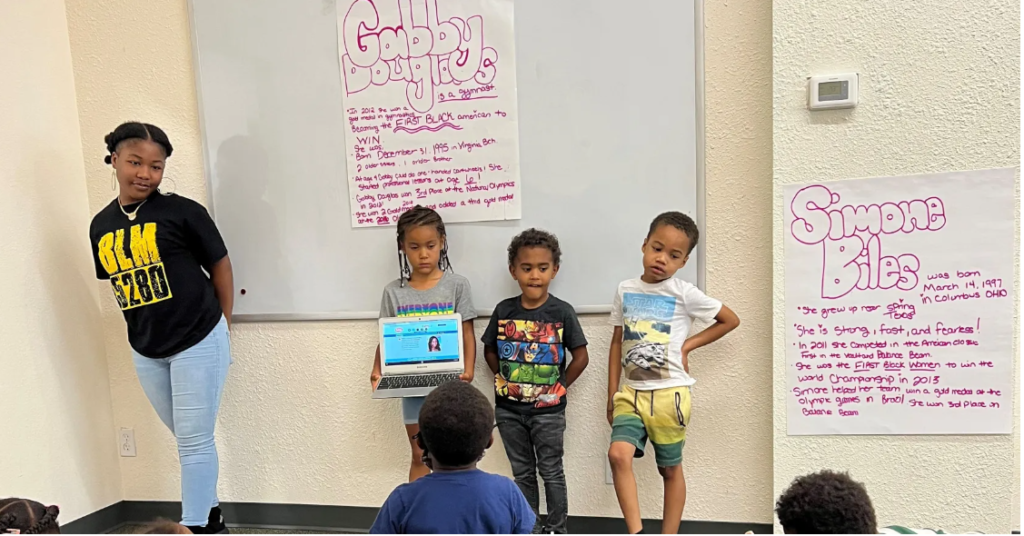Photo: Three candidates for an open at-large seat on DPS board at a Central Park forum on Sept. 19. (l-r), Kwame Spearman, John Youngquist and Paul Ballenger. A fourth candidate, Brittni Johnson, was unable to attend due to illness. For more information on Johnson go to her campaign web site: https://www.brittni4dps.com/ Click here to see all four candidates in a short piece on 9News.
On Sept. 19 three of the four candidates running for an open at-large seat on the Denver Public Schools board participated in a forum in Central Park to discuss various issues facing the district. Click here to see the forum on CPUN’s You Tube channel.
The candidates who attended the forum were:
Paul Ballenger
Kwame Spearman
John Youngquist
The fourth candidate in the race, Brittni Johnson, was unable to attend to due to illness. Click here for short profiles of the four candidates published in Central Park Education News earlier this month.
There are two board district seats (in southeast and northwest Denver) that are also up in the Nov. 7 election, but the at-large seat is the only one Central Park residents can vote on. The seat opened up after incumbent Auon’tai Anderson chose not to seek re-election.
The candidates spoke about declining enrollment, the most important needs of students, evaluating the superintendent and segregated schools. They all agreed that bringing back SROs (school resource officers from the Denver Police Department) to high schools is a good idea. But their role must be clearly defined and an actual plan of how the district and the police will work together (there currently is not such a plan), the candidates said. Click here for more information on what the school board does and why it matters.
The hourlong forum was sponsored by Central Park United Neighbors and the Foundation for Sustainable Urban Communities. It was moderated by CPUN past president Amanda Allshouse and CPUN board member and chair of its education committee, Carol Hunter. It was held at the Cube, an event space of the Central Park MCA at 8371 Northfield Blvd. Click here for more information on the candidates committees and finances on the DPS board election page.
Below are the forum questions and answers from the candidates. Responses have been edited for clarity.
Why are you running?

Ballenger: My daughter goes to McAuliffe and I’ve seen poor security in schools.
“It’s important to have that safety side and leadership on our board and right now there is neither.’’
My priorities:
- Good leadership
- Strong governance
- Community building
“Three things that are missing right now … and also holding our superintendent accountable.’’
Spearman:
“Education is in my blood.’’ My grandmother and mother were teachers and principals (mother in DPS).

DPS has made me, given me great opportunities. What we need from board members are strategic vision, leadership and the ability to represent our community.
“I think I can do all three.’’
Youngquist:
I’ve been an educator for 35 years – classroom teacher, principal 18 years, regional and assistant superintendent and chief academic officer, the majority in DPS.

I was principal of East High School for 10 years and have two daughters at East now. On the day of the shooting of two East administrators last spring I met my daughters near campus and was shaking from worry and sadness.
“What we need right now from our board of education is a member who has seen much. Someone who has seen the challenges and opportunities in our district, our community, our city . . . and able to act in ways that solve those greatest challenges.’’
What are the most important needs of students and how should they be addressed?
Ballenger:
The priority is the achievement gap between white students and students of color.
“We need to be much more innovative and much more pragmatic in how we solve the problem.’’
We need to replicate programs and practices that are doing well in DPS.
Spearman:
We need more support for teachers. They can’t afford to live in Denver as they used to. And provide more compensation. We need to provide housing and more benefits like maternity leave. “If we have supported teachers, they will support students.’’
The achievement gap: “It’s appalling.’’
Youngquist:
Three things: They need to be safe in school but DPS and the Denver police department do not have a good working relationship.
They need to have sufficient mental health supports.
And we weed to focus on teaching and learning.
Enrollment in DPS is declining. What do you attribute that to and how do you balance that with the growth in enrollment in areas like northeast Denver (Central Park, Green Valley Ranch)?
Ballenger:
Safety is important to keep students. Families look at other districts, privates because of safety concerns.
“People are freaked out. Last year really did a number on people.’’
We need to hire the best teachers so people want to stay. And we need to innovate, tap into the talent and resources of local colleges and companies.
Spearman:
“I am part of the problem.” I am 39 with no kids but I plan to have them. I’m In house that was previously home to a family of four.
“And that’s going to keep happening” because of the high cost of single family houses.
But we should not close schools. Need to offer more wrap around services to make better use of schools and make them more useful to communities.
Also get seniors and others to mentor and volunteer in schools.
In Central Park you have good schools. “We need to leverage the fact that you all have good schools.
“We need to use what is working here and expand on it so others have access to it.’’
Youngquist:
The birth rate dropping which is a big problem. The cost of housing is a problem to keep families. And confidence in DPS is down. School safety and the response to it has hurt.
“We need to regain the confidence from our parents and families in who we are and what we are about.’’
The superintendent is the only employee of the board. What criteria would you use to evaluate his job performance?
Ballenger:
“There is a framework to evaluate him, but it is not being used.” A review is due in October so I’ll be interested to see how that goes.
Safety is very important. We need metrics to do evaluate how well the district is dealing with safety issues from teachers, students, families.
Academic achievement and closing the achievement gap between white students and low income and students of color. We need to retain teachers and students.
Spearman:
In the early 2000s we had the Denver Plan that had goals and metrics for all aspects of the district’s operation. Not anymore.
“A lot of that plan worked. The problem I have right now is – What is the plan? Ask yourself – What is the plan?”
“The first thing the board has to do is force the superintendent to have a vision we can get behind as a community.’’
Secondly, we have to hold the superintendent accountable.’’
“Lastly, the board should not be the show. Unfortunately, the board is the show right now.’’
Youngquist:
An annual report on the district came out last week (Sept. 18).
“What we saw was essentially no growth. It is a general recognition of what is not happening in Denver Public Schools.’’
“The district has great potential . . . but what we’re not seeing are the expectations from the superintendent of what we will see. . . especially on teaching and learning. . .
“They (teachers) are not feeling a connection and support in ways that will help advance their efforts.’’
How do you plan to communicate regularly with the community and work with other board members?
Ballenger:
“I love community.’’
I like to listen and talk w/ people. “I will definitely make that a priority.’’
“I believe in public comment’’ at board meetings. I have done it myself with the current board. “I think it’s really critical that the school board really listens to people.’’
And the five district reps need to do better listening to their constituents.
Spearman:
Representation matters. All areas of the city deserve representation. We need to have meetings w/different neighborhoods.
“I will do that.’’
“The board needs to be united and needs to be a collective leader . . . how I will do that with members is treating them with the respect they need.’’
Youngquist:
As I have in my other education roles, “First, I come and listen. What we do when we listen closely is we begin to build trust.
“When people see responses to what has been said, in ways that are meaningful to them, in regard to work that’s being done for their children’’ is critical.
Will you support innovation schools and what will you do to support and empower them?
(Innovation schools are district schools that gain waivers from local and state policies, rules and collective bargaining agreements to better serve their students. They are entrepreneurial and autonomous to control their budgets, staffing, programming and other operations – nearly identical to how charter schools function. There are six innovation schools that serve Central Park: Inspire, Isabella Bird, McAuliffe, Northfield High School, Swigert and Willow.)
All three candidates support innovation schools.
Ballenger:
“My daughter went to one last year (McAuliffe) and she and the other students got a great education.”
The district needs to do a better job of supporting them.
“District leadership and guidance has been spotty at best the last few years.”
Spearman:
He went to Smiley Middle School before it changed to McAuliffe International and that clearly was for the best.
“We need more choice and attract students from outside the district and innovation schools do that. If something is working we need to keep doing that.”
But the district has shown poor support and made some terrible decisions on innovation schools.
“Let’s talk about the elephant in the room: We should not have fired Kurt Dennis.’’
Youngquist:
Innovation schools “need flexibility’’ for their students and community.
“Right now we are lacking a vision as to how it is our community of schools work together.
“There are schools that feel disrespected because they are seeing a board of education, that without rationale, seems to be making decisions about their existence . . . primarily innovation schools.’’
Explain why you support SROs (Denver police officers in schools) and your assessment of the discipline matrix and the best strategies to achieve a culture of safety.
All three candidates support SROs.
Ballenger says there needs to be a well-defined plan on how they are used and the relationship between DPS and the Denver Police Department which does not exist now.
Youngquist noted that when the board initially removed SROs three years ago he was one of 17 principal to oppose the idea telling the board: “You don’t have a plan’’ on what to do without them.
In addition, Youngquist said schools must be vigilant about the type of offenses that require police involvement and be sure to avoid past problems with a disproportionate number of students of color being suspended or jailed as a result of over-policing.
The trio also agreed that the district’s discipline matrix is ineffective and needs revision. For instance, currently students who are criminally charged with a weapons offense off school grounds can still attend their school.
“We can not have people who are shooting people outside of schools remain in our classrooms,’’ Spearman said. “That’s absolutely insane.’’
As for creating a culture of safety, Ballenger said the board needs to take security seriously and “right now that is simply not happening.’’
Denver Public Schools remains, as it has been for decades, segregated by race and income with low achievement predominant in schools with low income and minority students. How should the district respond to this reality?
All three candidates praised the district’s choice process and said it has potential for all students to attend a school that best fits their learning styles and other needs.
However, they also conceded what educational research has long established:
Unless a family can supply their own transportation and parents can arrange their schedules around school start and dismissal times, there is no choice outside their neighborhood which likely has few quality choices.
“Unfortunately for Black and Latino parents the number one factor when deciding on a school is proximity” to their home, Spearman said.
Ballenger said “there’s got to be a practical solution,’’ suggesting the district consider creating zones that include more choices and supply bussing to students who need it to attend the school of their choice.
Youngquist noted that when he was principal of East High School the admission process prioritized a certain number of seats for low income and minority students but even then, a small percentage of the enrollment benefitted.
“We live in a segregated city,’’ Youngquist said. Difficult conversations are needed to overcome the impact of that racial separation.
“Who we are and what do we want to become as a city’’ is what has to be addressed, he said.
Candidates also asked each other a question.
Youngquist to Spearman
Youngquist: You’ve said you support good neighborhood schools as one method to address the segregation of Denver schools. You’ve also said charters and innovation schools can help with integration. Which is it, and how are you solving the problem?
Spearman: “Choice is the biggest factor outside of neighborhoods that leads to segregation,’’ he said. “If you don’t like the school in your neighborhood and you’ve got the resources (i.e. transportation, parental time) you can choose a school elsewhere.
“What we’ve got to do is have great schools in every neighborhood. The way that we do that is we have diverse schools in every neighborhood.’’
Spearman to Ballenger
Spearman: School safety is your biggest issue. What would you do to improve safety in DPS?
Ballenger: At a minimum I’d like to see every school have properly secured doors in every vestibule and other external doors.
We should have ballistic film on first floor windows.
(According to NGS, National Glazing Solutions, a national window film installation company, there is no easy or cheap way to bulletproof your existing glass windows reliably. However, you can use safety and security window film to delay or deter active shooters.)
“You’re buying time and space for your people to find cover’’ and give police time to respond, Ballenger said.
The DPS climate and safety department needs to be properly funded, which is not the case now. Teachers and school staff need more thorough training on various safety and precautionary procedures, which also is not happening, Ballenger said.
Ballenger to Youngquist
Ballenger: Student achievement in DPS has been in decline. Given your long background in education, do you think DPS has the tools to be successful if it has the right leadership at the administrative level and the school board level?
Youngquist: Yes and “I don’t believe it will take long to turn the corner because I believe in the teachers in the classrooms and the principal leaders in the schools.’’
But we lose too many of those people if they do not get better support from the district and better leadership from the board.
“When teachers don’t have the right resources, they don’t last long.’’




